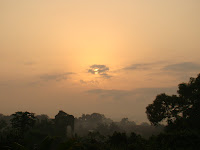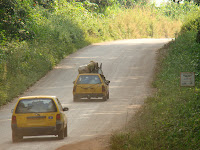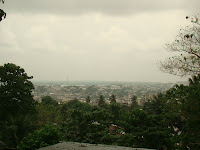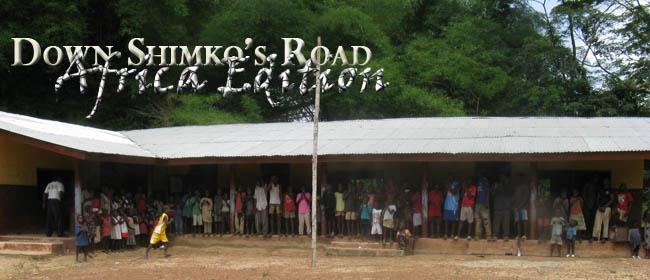 This was a good exercise in patience, because most Americans do not have it. I will admit it was frustrating, and a bit worrisome, not knowing if I was going to make it to Monrovia in time to confirm my flight and return home. But as the day wore on, and as Joe made arrangements for my flight confirmation, my anxiety diminished and I began to take life in stride.
This was a good exercise in patience, because most Americans do not have it. I will admit it was frustrating, and a bit worrisome, not knowing if I was going to make it to Monrovia in time to confirm my flight and return home. But as the day wore on, and as Joe made arrangements for my flight confirmation, my anxiety diminished and I began to take life in stride.  After I had said goodbye to the Dwehs, except the pastor who was travelling with us, I nestled into what would be my seat for the next 13 hours and took one last, longing look at the town that opened my eyes to a whole new world. Saying goodbye to a family can be hard, but saying goodbye to a place that has changed my entire outlook on life is nearly impossible.
After I had said goodbye to the Dwehs, except the pastor who was travelling with us, I nestled into what would be my seat for the next 13 hours and took one last, longing look at the town that opened my eyes to a whole new world. Saying goodbye to a family can be hard, but saying goodbye to a place that has changed my entire outlook on life is nearly impossible.  The city landscape is vastly different from many I have seen before. The cities are mixed between glorious buildings symbolic of the rebuilding occurring in the war-torn nation alongside bombed-out shelters. The nation's capitol building is across the street from a walled structure that once maintained some home or business but not acts as a shelter for many families. The walls are blackened by fires long extinguished and the signs of a war that nearly destroyed the oldest African republic are evident throughout. There is little joy taken from the sights of children scrounging for food or families living in gutted buildings, barely surviving beyond the day. It is a stark contrast to the quiet life in Zwedru.
The city landscape is vastly different from many I have seen before. The cities are mixed between glorious buildings symbolic of the rebuilding occurring in the war-torn nation alongside bombed-out shelters. The nation's capitol building is across the street from a walled structure that once maintained some home or business but not acts as a shelter for many families. The walls are blackened by fires long extinguished and the signs of a war that nearly destroyed the oldest African republic are evident throughout. There is little joy taken from the sights of children scrounging for food or families living in gutted buildings, barely surviving beyond the day. It is a stark contrast to the quiet life in Zwedru. I could never imagine longing for the quiet afternoons in Zwedru, sitting in the growing shade beside the house and visiting with whomever decided to stop by that day. I will miss my time with the Dwehs and I will miss the kids at the schools clamoring to touch my pale (now slightly darker) skin and meet the American. I'll miss the exotic, and now very familiar, food filled with flavor and spices each revealing a new insight into African life.
But, I also look forward to my return home. I will arrive on Thanksgiving and could not think of a time more appropriate to return. There is much to be thankful for in my life, and now so much more. I can say the most I am thankful for, however, is being an American. I am impressed with life in Liberia; how they can live so fully with so little. But I am thankful for having a government I can complain about that will listen to my grievances. I am thankful for having the opportunity to take a car from one city to the next, or even one state to the next, without delay or haggling over price. I am very thankful for having a home with running water. I am most thankful, however, for the ability to choose to live the life I want without worry.



No comments:
Post a Comment